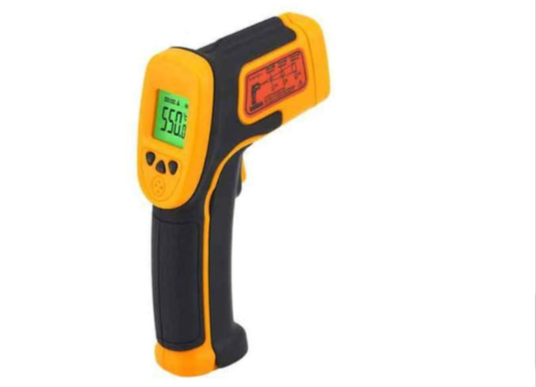In today’s fast-paced world, technology continues to revolutionize various industries, and the field of temperature measurement is no exception. Among the many innovations in this realm, Digital Infrared Thermometers, often referred to as IR thermometers, have emerged as essential tools in a wide range of applications. These devices offer quick and non-contact temperature readings, making them invaluable in scenarios where precision and efficiency are paramount. In this comprehensive guide, we will delve into the features, benefits, and applications of IR thermometer, shedding light on their significance across industries.
Understanding Infrared Thermometers
Digital Infrared Thermometers operate on a simple principle: they measure temperature by detecting the infrared radiation emitted by an object. This technology allows them to capture accurate temperature readings without making physical contact with the object in question. The primary components of an IR thermometer include:
1. Infrared Sensor
The heart of an IR thermometer is the infrared sensor. This sensor absorbs the infrared radiation emitted by an object and converts it into an electrical signal. The accuracy and sensitivity of this sensor are crucial in determining the precision of the temperature measurement.
2. Optics
The optics of an IR thermometer focus the infrared radiation onto the sensor. The quality of the optics greatly influences the device’s ability to capture accurate readings, especially at a distance.
3. Display and Processor
Modern IR thermometers come equipped with user-friendly digital displays that show the temperature readings. A built-in processor processes the data from the sensor and displays it on the screen.
Features of Digital Infrared Thermometers
IR thermometers offer a plethora of features that make them indispensable in various sectors. Here are some notable features:
1. Non-Contact Measurement
One of the most significant advantages of IR thermometers is their non-contact nature. This feature ensures that the device can measure temperatures from a safe distance, making it ideal for situations where contact could be hazardous or impractical.
2. Speed and Accuracy
Digital Infrared Thermometers provide quick and accurate temperature readings, often within seconds. This makes them invaluable in scenarios where time is of the essence, such as industrial settings or medical applications.
3. Temperature Range
IR thermometers come with a wide temperature range, allowing them to be used in diverse environments, from extremely cold to scorching hot conditions.
4. Data Storage
Many modern IR thermometers are equipped with data storage capabilities, enabling users to record and analyze temperature measurements over time. This feature is particularly useful for quality control and process optimization.
5. Emissivity Adjustment
Emissivity is a crucial factor when measuring the temperature of different materials. IR thermometers often allow users to adjust the emissivity settings to ensure accurate readings on various surfaces.
6. Laser Targeting
Some IR thermometers come with laser targeting systems that help users precisely identify the spot they want to measure. This feature enhances accuracy, especially when measuring small or specific areas.
Benefits of Using IR Thermometers
The adoption of Digital Infrared Thermometers offers numerous benefits across various sectors:
1. Health and Medical
In the healthcare industry, IR thermometers have become a staple for non-invasive temperature monitoring. They are used in hospitals, clinics, and even at home for checking body temperatures, making them an essential tool during the COVID-19 pandemic.
2. Industrial and Manufacturing
IR thermometers are indispensable in industries where temperature control is critical. They are used for monitoring equipment, checking product quality, and ensuring safety in manufacturing processes.
3. HVAC and Building Maintenance
Heating, ventilation, and air conditioning (HVAC) professionals rely on IR thermometers to diagnose issues with HVAC systems, identify energy inefficiencies, and conduct preventive maintenance.
4. Food Service and Safety
In the food industry, IR thermometers are used to check food temperatures, ensuring that food is stored and cooked at safe temperatures, preventing foodborne illnesses.
5. Automotive and Aerospace
IR thermometers play a vital role in the automotive and aerospace sectors, where they are used to monitor engine temperatures, inspect composite materials, and test thermal protection systems.
6. Electrical and Electronics
IR thermometers are used to detect hot spots in electrical circuits, helping to prevent electrical fires and equipment failures.
Applications of IR Thermometers
IR thermometers find applications in a wide array of fields due to their versatility and accuracy. Here are some specific use cases:
1. Body Temperature Screening
In the wake of the COVID-19 pandemic, IR thermometers gained widespread use for screening individuals’ body temperatures at entrances to public spaces, transportation hubs, and workplaces.
2. Home and Personal Use
IR thermometers are now commonplace in households for checking the temperature of individuals, pets, or even monitoring the temperature of appliances and HVAC systems.
3. Cooking and Food Safety
In the culinary world, IR thermometers are used to check the temperature of food items, ensuring they are cooked to perfection and safe for consumption.
4. Industrial Processes
Manufacturing and industrial processes rely on IR thermometers to monitor temperatures of machinery, detect hotspots, and ensure product quality.
5. Building Inspections
In the construction and building maintenance industry, IR thermometers are used to inspect insulation, identify water leaks, and assess HVAC system efficiency.
6. Automotive Diagnostics
In the automotive sector, IR thermometers help diagnose engine issues, assess brake and tire temperatures, and monitor exhaust systems.
Conclusion
Digital Infrared Thermometers have become indispensable tools across a myriad of industries, offering speed, accuracy, and safety in temperature measurement. Their non-contact nature, wide temperature range, and versatile features make them suitable for various applications, from healthcare to manufacturing, and from food service to automotive diagnostics.
At Certified Material Testing Products, we recognize the significance of IR thermometers in modern society. As a leading provider of cutting-edge temperature measurement solutions, we offer a range of high-quality IR thermometers tailored to meet the unique needs of our customers. Whether you require precise body temperature screening or industrial-grade temperature monitoring, our products are designed to deliver exceptional performance and reliability. Contact us today to explore our range of Digital Infrared Thermometers and discover how they can benefit your specific application.











